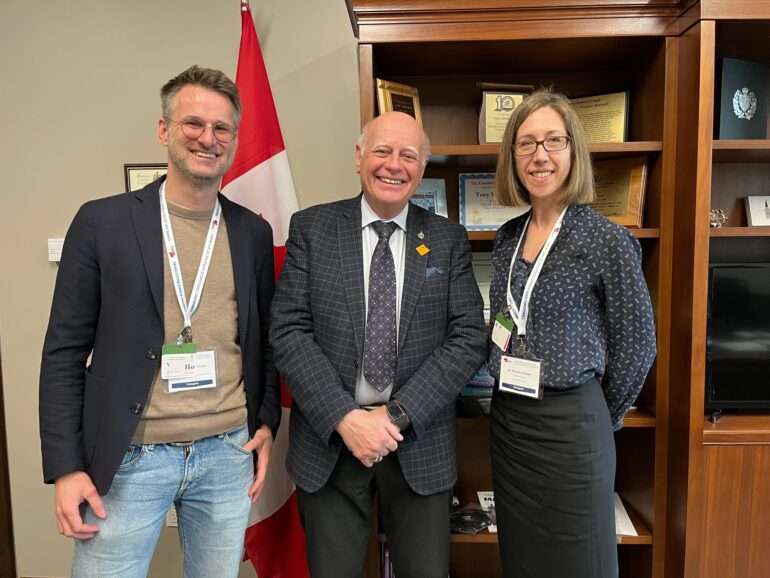In an era where scientific advancements are shaping our world at an unprecedented pace, it is crucial that scientists and policymakers work hand in hand to ensure evidence-based decision-making. Recognizing this need, the Canadian Science Policy Center launched the Science Meets Parliament (SMP) program in 2018. This initiative aims to bridge the gap between scientific research and policy development by fostering direct engagement between scientists and parliamentarians. The recently concluded SMP 2023 event showcased the power of building relationships and the importance of scientists being trained in the art of raising pertinent issues in a constructive manner.
Dr. Penney Gilbert, an associate professor at the Institute of Biomedical Engineering at the University of Toronto, was one of the delegates selected to participate in the 2023 SMP program. She was a representative of the Stem Cell Network, which was a generous sponsor of the event. As a stem cell scientist working on predictive human cell-based assays and advocating for the reduction of animal usage in scientific research, Dr. Gilbert became interested in engaging with parliamentarians about using policy to drive science.
“Through my research, I aim to create assays that enable the scientific community to reduce or eliminate the use of animals in experiments. By demonstrating the equivalent results achieved with human cell-based assays, we can contribute to the validation and acceptance of these alternative methods.” Said Dr. Gilbert, “This not only aligns with the government’s goal of phasing out animal testing for toxicity by 2035 but also offers translational advantages by utilizing human cell systems in studying biology.”
The Liberal Party of Canada shares this perspective, as evidenced by their 2021 platform mandates and the recently passed Bill S-5, which includes a focus on animal welfare and the gradual elimination of animal use for toxicity testing. This alignment of goals and values provides an opportunity for researchers to engage with parliamentarians and discuss the potential of human cell-based assays as alternatives to animal testing.
“I believe an important part of the program is to build dialogue between parliamentarians and scientists.” Said Dr. Gilbert.
The SMP program seeks to cultivate relationships and effective communication between scientists and parliamentarians, creating an environment where scientific expertise is readily available to inform policy decisions.
Traditionally, parliamentarians have relied on government-employed scientists for scientific advice. However, by actively reaching out to policymakers, scientists can ensure their research findings are directly communicated and understood.
The program targets motivated individuals, specifically, mid-career Tier 2 Canada Research Chairs and Banting Postdoctoral Fellows, providing them with the necessary skills to understand science policy, and policy for science, at the parliamentary level. Participants undergo online training sessions covering various topics such as science policy, equity, diversity, and inclusion in science, the Library of Parliament, and science communication. The program culminates in a two-day event in Ottawa, where participants receive further training on connecting with parliamentarians and engage in casual conversations with them.
Parliamentarians such as Elizabeth May (Co-lead of the Green Party) and Tony van Bynen (Liberal Party representative), were two government representatives who were able to meet with scientists this year.
The Science Meets Parliament program in Canada represents a significant step towards strengthening science-policy collaboration. By facilitating direct engagement between scientists and parliamentarians, the program empowers scientists to actively contribute to evidence-based decision-making.
“Through building relationships and advocating for scientific issues, scientists can shape the future of Canadian society.” said Dr. Gilbert. “As we embrace a future driven by scientific advancements, the collaborative efforts between scientists and policymakers are vital to address the complex challenges we face and create a better world for all.”
To learn more about the Science Meets Parliament program, please visit here. This program is open to registration to Tier II Canada Research Chairs, indigenous researchers, and banting postdoctoral fellows. For trainees who are interested to get involved, they can participate in the planning and the organization of the Canadian Science Policy Conference.


